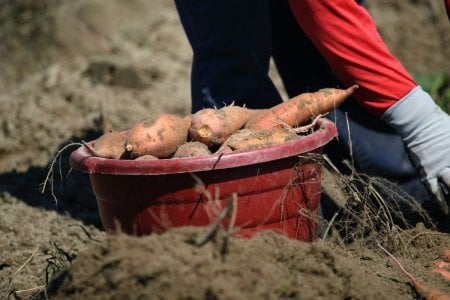Cut your blood sugar levels with this easy hack for making sweet potatoes
- Replies 5
As we get older, it's more important than ever to watch what we eat and how it affects our bodies – especially when it comes to blood sugar levels.
There are a lot of foods out there that can have a big impact on our blood sugar, for better or worse. And if you're not careful, those spikes and crashes can really take their toll – making us feel fatigued, irritable and generally unwell.
Fortunately, though, by making a few small tweaks here and there to the way we prepare our meals, we can make a big difference when it comes to managing our blood sugar levels. And one of those tweaks is how you cook your sweet potatoes!
That's right: according to ‘functional medicine’ expert, Amy Sapola, the way you prepare your sweet potato can have a drastic effect on its glycemic index score – which ultimately affects your blood sugar response.
To be specific, if you want to minimise the impact sweet potatoes have on your blood sugar levels, it’s best to boil rather than roast them. Roasting sweet potatoes takes their glycemic index score from 60 to 90—which is pretty drastic for such a simple change. Alternatively, boiling sweet potatoes whole for at least 20 minutes, ‘is the best way to keep the glycemic impact low’. Sapola does acknowledge that experts will usually advise against boiling your vegetables since you lose many of their valuable nutrients in the cooking water, ‘however, sweet potatoes are a very rare exception’.
After you have boiled your sweet potatoes and let them cool, you can get creative! You may opt for a healthier spin on a classic mashed potato or if you’re still in the mood, you can whip up a beautiful sweet potato soup. Whatever way you choose to have your boiled sweet potatoes, you’ll be soaking up the nutrients they have to provide all while minimising the potential blood sugar spike. But of course, if you do prefer your sweet potatoes roasted, that’s fine too! The nutritious veggie boasts plenty of health benefits, regardless if it makes your blood sugar spike or not. It’s just for those of us who need to keep a close eye on our blood sugar, boiling the beloved veggie is probably the best option.
So, what’s the takeaway? If you want to eat sweet potatoes, but don’t want them to spike your blood sugar, try boiling them, rather than roasting them. This method will take the glycemic index impact down a few points and maybe even challenge your cooking creativity. Do you have any recipes that include boiled sweet potatoes? Share them with us below! In the meantime, enjoy this sweet potato mash recipe we found that looks delicious!
There are a lot of foods out there that can have a big impact on our blood sugar, for better or worse. And if you're not careful, those spikes and crashes can really take their toll – making us feel fatigued, irritable and generally unwell.
Fortunately, though, by making a few small tweaks here and there to the way we prepare our meals, we can make a big difference when it comes to managing our blood sugar levels. And one of those tweaks is how you cook your sweet potatoes!
That's right: according to ‘functional medicine’ expert, Amy Sapola, the way you prepare your sweet potato can have a drastic effect on its glycemic index score – which ultimately affects your blood sugar response.
To be specific, if you want to minimise the impact sweet potatoes have on your blood sugar levels, it’s best to boil rather than roast them. Roasting sweet potatoes takes their glycemic index score from 60 to 90—which is pretty drastic for such a simple change. Alternatively, boiling sweet potatoes whole for at least 20 minutes, ‘is the best way to keep the glycemic impact low’. Sapola does acknowledge that experts will usually advise against boiling your vegetables since you lose many of their valuable nutrients in the cooking water, ‘however, sweet potatoes are a very rare exception’.
After you have boiled your sweet potatoes and let them cool, you can get creative! You may opt for a healthier spin on a classic mashed potato or if you’re still in the mood, you can whip up a beautiful sweet potato soup. Whatever way you choose to have your boiled sweet potatoes, you’ll be soaking up the nutrients they have to provide all while minimising the potential blood sugar spike. But of course, if you do prefer your sweet potatoes roasted, that’s fine too! The nutritious veggie boasts plenty of health benefits, regardless if it makes your blood sugar spike or not. It’s just for those of us who need to keep a close eye on our blood sugar, boiling the beloved veggie is probably the best option.
So, what’s the takeaway? If you want to eat sweet potatoes, but don’t want them to spike your blood sugar, try boiling them, rather than roasting them. This method will take the glycemic index impact down a few points and maybe even challenge your cooking creativity. Do you have any recipes that include boiled sweet potatoes? Share them with us below! In the meantime, enjoy this sweet potato mash recipe we found that looks delicious!








